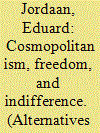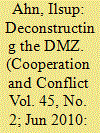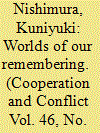| Srl | Item |
| 1 |
ID:
090166


|
|
|
|
|
| Publication |
2009.
|
| Summary/Abstract |
Despite cosmopolitanism's concern for the world's poor and its concomitant heavy moral demands, cosmopolitans establish a limit to the self's responsibility for the global poor. This contrasts with Emmanuel Levinas's view that the self has an infinite responsibility for the other, a responsibility that derives from the self's questioning of the impact of his freedom on others. From a Levinasian perspective, cosmopolitanism's restriction of the self's responsibility for others creates a sphere of rightful indifference to the needs of the other; lends legitimacy to a disregard of the other; forestalls an ethical awakening to the other; constrains the achievement of a more just global order, given that, from a Levinasian perspective, a better justice is built on the self's open-ended responsibility for the other; and points to a tension at the heart of cosmopolitanism, considering the coexistence of elements that both frustrate and aspire to the achievement of global justice. It is concluded that the achievement of cosmopolitanism's goals would require the acceptance of an open-ended responsibility for the other.
|
|
|
|
|
|
|
|
|
|
|
|
|
|
|
|
| 2 |
ID:
097795


|
|
|
|
|
| Publication |
2010.
|
| Summary/Abstract |
The Demilitarized Zone (DMZ) has been a global symbol of perpetual conflict, hatred and distrust since its establishment in 1953 after the Korean War. The 155-mile ceasefire line has given birth to moral pathologies in the minds of Korean people that include 'otherness is evil', 'containment of war is peace' and 'restoration of the same is unification'. The purpose of this article is to reduce these moral pathologies through Jacques Derrida's deconstructive approach and Emmanuel Levinas's ethics of the Other. Through tripartite reduction of these moral ideologies of the DMZ, an ethical thesis is developed that peace is not a mere state of the absence of war, but rather a welcoming of radical others and differences. It is also argued that unification is not about restoring the same 'original we', but about co-reconstruction of the 'democratic we'.
|
|
|
|
|
|
|
|
|
|
|
|
|
|
|
|
| 3 |
ID:
104060


|
|
|
|
|
| Publication |
2011.
|
| Summary/Abstract |
Attempts to deal with the agent-structure problem have often resulted in the introduction of alternative forms of structuralism. Scholars have thus failed to observe the construction and reconstruction of subjectivity, which occurs as an eternal process because of the simple fact that each of us lives in his or her own time. This article attempts to provide an alternative approach to the agent-structure problem by reformulating it as an issue of identity. Especially in comparison with Lévinas, Ricoeur's thought of memory proves helpful in grappling with the problem, not by presupposing the coherent entity of either agent or structure, but by directing our attention to the in-between. It also enables a nuanced analysis of social change, which always needs to be comprehended in its tension with the leanings toward stability. A brief analysis of the literary discourses after the Great War illustrates this point. As a whole, the article aims to recover beings' temporality at the centre of the agent-structure problem and thus reconstruct the problem as innately unstable agents' search for their constantly changing identity.
|
|
|
|
|
|
|
|
|
|
|
|
|
|
|
|